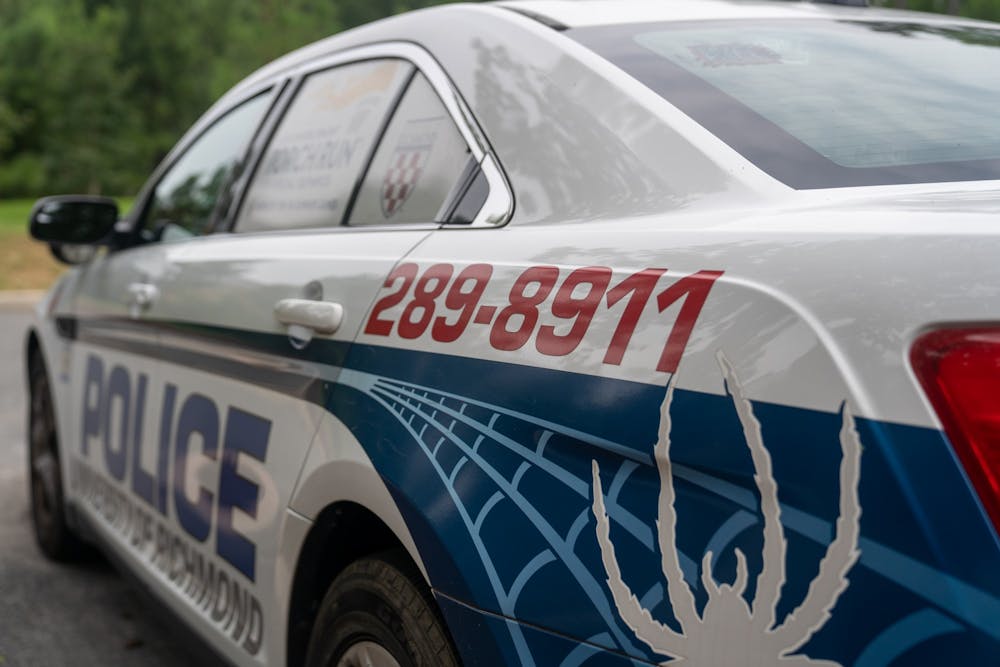The University of Richmond Police Department is working to have a proposal approved by UR to obtain body cameras that would be worn by all police officers on campus, according to a February email sent out by URPD Chief of Police David McCoy.
McCoy's email was addressed specifically to students and was sent following two then-recent verbal incidents that occurred among students, a security officer and a police officer. In the email, he detailed steps URPD was taking to prevent future incidents and create a more inclusive community, including developing a proposal to obtain body cameras for police officers.
URPD has been looking to integrate body cameras for "quite some time," McCoy said, as doing so has become more common in national and local municipalities -- including in the Virginia Commonwealth University Police Department, whose officers began wearing cameras in 2015.
McCoy could not provide a specific timeframe for when the body cameras will become live, saying only that URPD "continue[s] to work towards approval.”
The incidents referenced in the February email did not directly prompt the camera proposal, McCoy said. Instead, they provided an opportunity to propose implementing body cameras and show how cameras can deescalate a negative interaction, he said.
“If [using body cameras] helps change behaviors on both the individual involved and the officer and it provides some light from both sides, I think it's a win-win for the entire community,” McCoy said.
Currently, URPD is determining which body camera vendor to enroll with and how to train officers to use the cameras, McCoy said.
URPD wants to ensure the vendor they end up choosing provides them with the flexibility to use the cameras for a period of two to three years if URPD no longer feels that they are necessary, McCoy said.
“We’d need to get the community involved and ask them, ‘How do you feel about officers carrying cameras around?’'' McCoy said. “We’d see if we wanted to continue this down the road or [whether] we have a comfort level where they’re not needed anymore.”
One obstacle URPD might face in using body cameras would be an incident when an officer does not have their camera on -- whether intentionally or by accident, McCoy said.
URPD officer Renee Walcott agreed with this concern, and said there was a learning curve officers would have to go through with using body cameras.
Walcott has been working in the police force for over 20 years at various agencies, she said. She supports the body camera proposal and said wearing a body camera would not bother her at all.
Enjoy what you're reading?
Signup for our newsletter
“Body cameras are a very good way to be transparent,” Walcott said. “What I do for a living -- dealing and talking with people, whatever the circumstance might be -- I don’t have any issue with that being recorded.”
Walcott said that along with providing transparency, body cameras would also be effective in determining the true character of a police officer on staff because the cameras could document an officer’s everyday actions and conversations.
“You want to know [the character of] your people,” Walcott said. “I think cameras would help us just know exactly who we have working here.”
Regenia Miller, a junior at UR, said that equipping URPD officers with body cameras would be helpful for behavioral purposes.
“I think it's very fair and responsible,” Miller said. “I think that because we have our own police department that body cams would be helpful, given how many other departments around the country have body cams just for the sake of accountability.”
In the most recent survey published by the Bureau of Justice Statistics, around half of the 12,267 local police departments in the United States had body cameras in 2016. Among police departments with over 500 employees, 70 percent used body cameras. Projections estimated a 10% increase in body camera use in the U.S. both in 2017 and 2018.
Miller said the cameras would help make a safer environment specifically for students of color.
“When a student is obviously being deviant from conduct or anything like that -- what is that officer telling the student?" Miller said about interactions students of color face with URPD. "Are they always reporting everything that needs to be reported?
“I think that’s what body cams would be helpful for.”
Contact sports editor Krystian Hajduczka at krystian.hajduczka@richmond.edu.
Support independent student media
You can make a tax-deductible donation by clicking the button below, which takes you to our secure PayPal account. The page is set up to receive contributions in whatever amount you designate. We look forward to using the money we raise to further our mission of providing honest and accurate information to students, faculty, staff, alumni and others in the general public.
Donate Now



